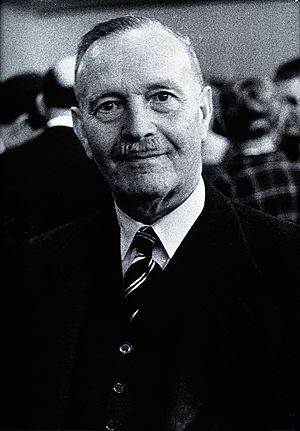Henry Edward Shortt facts for kids
Henry Edward Shortt (born April 15, 1887 – died November 9, 1987) was a famous British scientist who studied tiny living things called protozoa. He was born in Dhariwal, India, and grew up to become a very important researcher in medicine.
He went to school in Scotland and became a doctor at Aberdeen University in 1910.
A Doctor in India
In July 1910, Henry Shortt joined the Indian Medical Service. This was like being a doctor in the army in India. He moved up in rank, becoming a Captain in 1913, a Major in 1922, and a Lieutenant-Colonel in 1930. He took a short break in England before returning to India. In 1941, he became a Colonel. After World War II, he moved back to England for good.
During his time in India, he worked on important health projects. From 1926 to 1933, he was part of the Kala azar Commission, which studied a serious disease. He later became its Director. From 1934 to 1938, he was the Director of the King Institute of Preventive Medicine and Research in Guindy, Chennai. For his great work, he was honored with the title Companion of the Order of the Indian Empire (CIE) in 1941.
When he retired from service in India, he became a Professor at the University of London. He taught about medical protozoology, which is the study of tiny organisms that cause diseases. In 1949, he was chosen to be the President of the Royal Society of Tropical Medicine and Hygiene for two years. In 1950, he became a Fellow of the Royal Society, which is a very high honor for scientists.
Amazing Discoveries
Henry Shortt made huge discoveries that helped save lives. He focused a lot on a disease called kala-azar, also known as leishmaniasis. He proved that this disease was spread by tiny insects called sandflies. He also found that a medicine called urea stibamine could successfully treat kala-azar.
He also studied other important diseases and parasites:
- He looked into "Negri bodies" found in animals with rabies.
- He studied the life cycle of a parasite called piroplasma (Babesia canis) that lives in ticks.
- He researched parasites that cause malaria in monkeys.
- He discovered new types of protozoan parasites in animals.
One of his most famous achievements was with another scientist, Cyril Garnham. Together, they found the hidden stage of malaria parasites in mammals. This was a big step in understanding how malaria works and how to fight it.
Awards and Honors
Henry Shortt received several important awards for his scientific contributions:
- 1941: Companion of the Order of the Indian Empire (CIE)
- 1959: Manson Medal from the Royal Society of Tropical Medicine and Hygiene
His son, William, also became an Army Officer.
 | Calvin Brent |
 | Walter T. Bailey |
 | Martha Cassell Thompson |
 | Alberta Jeannette Cassell |


